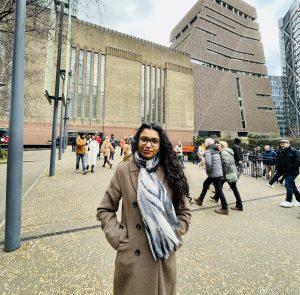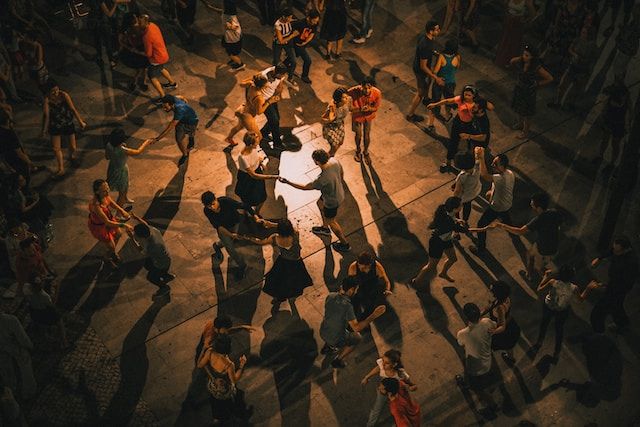Where do you work and what is your role?
I work as a Learning and Development Advisor at the University of London (UoL).
When did you join the SDF?
I joined the SDF in November 2022, a couple of weeks after starting my role at the University of London.
Why did you want to join the SDF?
I was introduced to the SDF through my line manager when I joined my current role in Learning and Development. Coming from a background in Chemical Engineering and research, I was relatively new to this field and eager to learn more and expand my professional networks. My manager recognised the value of connecting with other L&D professionals across the Higher Education sector and signed our team up to the forum. While I didn’t have prior knowledge about the SDF, I saw it as a fantastic opportunity to immerse myself in a community of experienced L&D professionals.
What’s the best thing about the SDF?
I have found tremendous value in the insights and expertise shared so openly by SDF members. There is a wonderful sense of openness and willingness to learn and share throughout the network, whether it’s via JISCMail or the annual SDF Festival of Learning.
What are you working on at the moment?
I’m usually engaged in several projects simultaneously, and I love the breadth and depth my role offers. These days, my main focus is on leading the design and delivery of our Academic Staff Development programme. This initiative aims to support our academic staff in their career growth, focusing on 3 key areas: Learning and Teaching, Research, and Leadership and Management. I’m currently organising a couple of targeted Q&A panel discussions on research funders and writing narrative CVs as part of research funding applications. This builds on the success of sessions we delivered last year on narrative CVs. I’m collaborating closely with our academic colleagues to ensure these discussions provide valuable insights. Additionally, I lead a bespoke programme of support for teaching and related professional services staff, helping them achieve Advance HE Fellowship and enhance their professional practice. Our recently re-launched mentoring programme for Academic Staff and Aspiring Researchers is also well underway. It has been rewarding to witness the establishment of new mentoring relationships, a positive impact of my efforts.
On another note, I led the establishment of our Digital Champions Network as part of a bespoke Digital Skills programme last year, and I’m preparing to re-open registrations of interest for the next cohort of Digital Champions. This is very exciting!
What does a typical day look like?
There are two things that happen consistently on a typical day because I structure my day with time blocking, so that I get the most out of it. I start my work day by spending a few minutes reviewing my to-do list (I love the Microsoft To-Do app) and adding/revising blocks of time dedicated to specific tasks around any meetings. I finish my work day planning for the next, adding any to-dos and scheduling time blocks. The activities in-between vary widely. These can include (but are not limited to) tasks such as drafting proposals and training briefs, holding meetings with internal or external collaborators, engaging in 1-1 consultancy conversations with colleagues, and facilitating training. While I work best with a rough plan, I’m adaptable and embrace unexpected challenges that arise each day.
Tell us about an event that altered the course of your life/and career
My mother’s unexpected passing in 2019 undoubtedly altered the course of my life and career. I won’t delve too much into this as it’s a deeply personal event.
The person who has influenced you the most is
My mother, through her deep adoration of reading and learning. She always encouraged me and challenged me to do things I never thought I could. From a very young age, she instilled in me a love of learning and the importance of personal awareness and development. These values have become the foundation of my career in Learning and Development, where I strive to create positive learning experiences for others and environments that foster continuous growth.
Work life balance – what leisure activity you enjoy the most?
There are two – reading and dancing Casino, i.e. Cuban salsa. I love curling up on the sofa with a good book and a cup of tea. This helps me unwind and recharge. My husband and I started going to Salsa classes last year, and we enjoy listening to Cuban music and practicing at home as well. When the weather is good, we join the people in our community after work to dance salsa in the local park, and typically end up in the pub afterwards. We’ve made a lot of friends in our new neighbourhood this way.
Something about you people would find surprising
I have only just started reading the Harry Potter series for the first time, and have not yet watched all the movies. One of my friends gifted me the first two Harry Potter books last Christmas, determined to ignite my enthusiasm for ‘the lightening-scarred orphan of international renown’. Needless to say, I’m hooked!
What is your greatest fear?
I have always feared the deep end of the swimming pool, simply because I cannot swim very well despite taking lessons throughout my childhood. My family jokes that I drink half the pool water whenever I attempt it (I panic).
Who would you invite to your dream dinner party?
I would invite Socrates, Marcus Aurelius, Boethius, and one of my good friends from the present day who would hate to miss this dinner party. There would be a fascinating exchange of ideas between these historical philosophers, and the modern-day trio (my friend, my husband, and I) would quiz them to no end!
What would your super-power be?
As I read Harry Potter, I’m beginning to think that Apparition is quite useful. Unlike Fred and George Weasely in the Order of the Phoenix, I would only use it for long distances. It would be wonderful to Apparate to my family home in Sri Lanka every now and then, have a lovely dinner of rice and curry, kottu, or string hoppers with my family there, pick up some of my father’s delicious egg roti for breakfast next day, and casually Disapparate back to my home in UK.
What’s your favourite/least favourite food?
Favourite food: Sri Lankan rice and curry, the way I used to have it growing up. We would almost always have dhal, a coconut milk-based lentil curry, and coconut sambol (freshly grated coconut, chilli, lime juice, and onions, all pounded and mixed together in a mortar and pestle) to go with red or white rice and another accompanying curry, like fiery capsicum, fish, or soya meat. A crispy fried egg sprinkled with lots of pepper and salt would top it all off. Simply phenomenal.
Least favourite food: Squid, cuttlefish, and other cephalopods, as I’m allergic.
What’s the worst job you ever had?
I’ve not had one, interestingly (or not!). Of course, there have been challenging instances in the jobs I’ve held, but none that I would call “the worst”.
What thing would improve the quality of your life?
Continuing to practice gratitude.
What’s coming next for you?
In the upcoming months, I will be contributing to some strategic projects that enable me to continue to build on the breath and depth of my work, with a particular focus on expanding my leadership skills. I’m eagerly anticipating my attendance at the upcoming ODHE Residential, representing my team. I see it as a fantastic opportunity to engage with and learn from other professionals in the field. I’m also very excited to be a facilitator for the South East Action Learning programme this year; this marks my first time facilitating a group coaching set. I’m looking forward to supporting colleagues across the sector to develop leadership skills and engage in collaborative problem solving. These opportunities not only contribute to my personal growth, but also enable me to make a positive impact within the university community.
